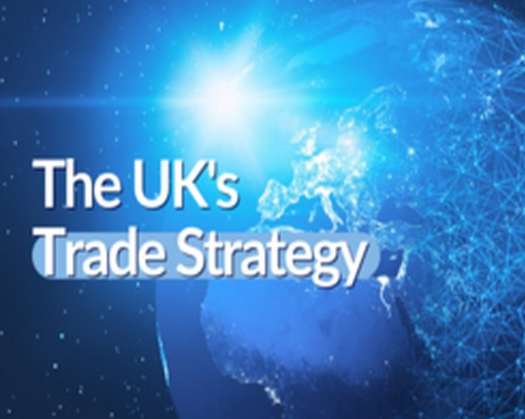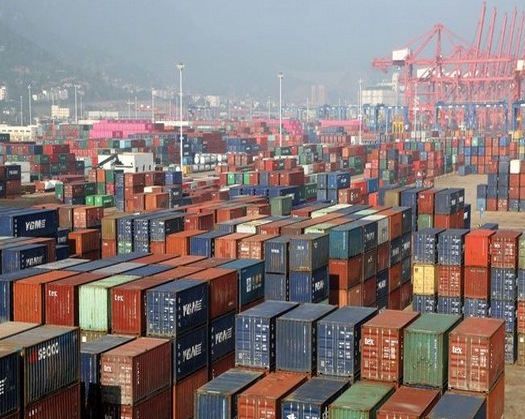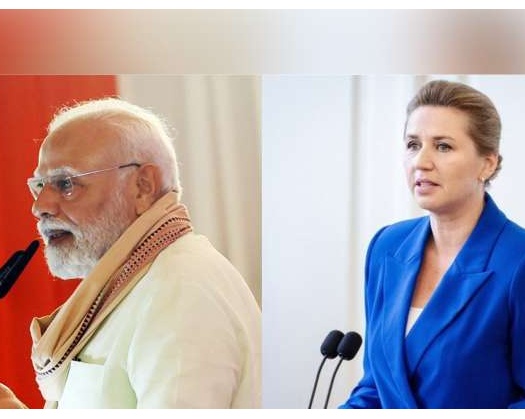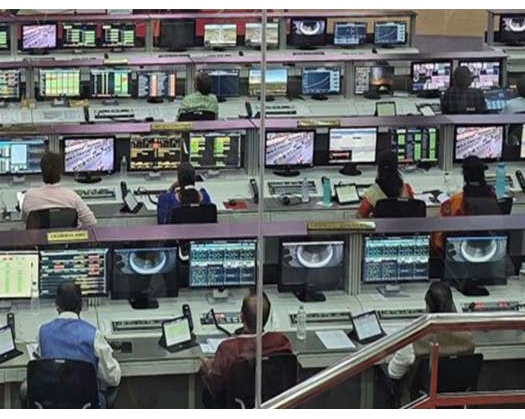London: On Thursday, the UK government unveiled a new Trade Strategy to make the country the most connected nation in the world, while safeguarding vital industries from global threats and enabling enterprises to prosper.
According to the new Trade Strategy, the UK will provide £5 billion for enterprises and increase UK Export Finance (UKEF) capacity to £80 billion, fostering expansion as part of the Plan for Change.
According to the statement, the UK is aiming faster agreements that businesses may benefit from earlier, with a particular emphasis on services and high-growth industries.
British companies will have greater access to global markets more quickly under the UK's first Trade Strategy since leaving the EU, which was announced today.
The new strategy will make the UK the most connected nation in the world, as well as secure billions of dollars in business opportunities, assisting economic growth to put money in people's pockets, strengthen local economies, create jobs, and increase living standards.
It takes a more agile and tailored approach than the previous government's, emphasizing quicker, more practical agreements that provide quicker benefits to UK firms.
It strengthens trade defenses, expands export finance for smaller businesses, and connects trade policy with national goals such as green growth and service.
The new strategy also creates £5 billion in opportunities for UK exporters through the Ricardo Fund, which will address challenging regulatory concerns, set global standards, and eliminate hurdles for UK firms selling overseas.
It also increases UK Export Finance (UKEF) capacity by £20 billion to £80 billion, introduces a new Small Export Builder to give smaller enterprises better access to export credit insurance, and includes improvements to help overseas buyers finance repeat orders from reliable UK suppliers more easily.
Furthermore, it promises to enhance the UK's trade defence toolkit and make its trade remedies system more agile, assertive, and accountable to protect British enterprises from global uncertainty and the rising threat of unfair trading practices.
It aims for more mutual recognition of credentials to enhance the UK's position as a services superpower, the world's second-largest exporter of services.
It expands on current clean energy and green sector pacts with partners such as Norway, Japan, and South Korea, while also seeking new, closer collaboration with nations like Brazil, the Philippines, and Mexico.
It declares that the United Kingdom will join the MultiParty Interim Appeal Arbitration Arrangement (MPIA), a temporary arbitration framework for settling appeals of WTO trade disagreements, demonstrating our commitment to an effective, rules-based international trading system.
The Trade Strategy is set against a backdrop of turbulent economic seas, with renewed protectionism and unfair trading practices posing major problems for UK firms and sectors.
Along with our new Industrial Strategy, a plan to expand the UK's growth-driving industries, we are strengthening businesses at home and providing a clear direction to guarantee successful abroad, creating high-paid, secure employment in every part of the country, according to the statement.
It follows three major trade agreements reached last month that will have considerable benefits for UK companies, employment, and consumers.
Not only does the agreement with India contribute £4. 8 billion to the economy and £2. 2 billion to annual salaries, but its reduced and liberalised tariffs mean that more whisky and gin are likely to be sold to Indian consumers, and British shoppers could see cheaper prices on clothes, footwear, and food.
Our historic agreement with the United States, the only one they have signed with any country, safeguards hundreds of thousands of British jobs, from automotive workers in the West Midlands to aeroplane builders in Wales and steelmakers in Scunthorpe. It illustrates the government's commitment to supporting British enterprises and prioritizing jobs and livelihoods, according to the statement.
The EU agreement, meanwhile, reduces red tape and improves access to the UK's biggest trading partner, according to the report. This implies that Scottish salmon producers may sell their fish more easily in the EU, Welsh sausages and lamb mince will no longer be prohibited, and British pets can accompany their owners on holiday with less trouble.
Prime Minister Keir Starmer stated, "What works for business works for Britain. " This translates to more employment, more prospects, and more money in people's pockets.
That's why I've supported British industry in the face of global headwinds, forging significant trade agreements with the United States, India, and the European Union that safeguard jobs and stimulate growth across the country. Today's Trade Strategy is a commitment to British business, assisting enterprises in selling more, growing faster, and competing globally. According to the statement, it's also about delivering growth as part of our Plan for Change and ensuring that working people feel the benefits.
Business and Trade Secretary Jonathan Reynolds stated, "The UK is an open trading nation, but we must balance this with the new geopolitical reality and act in our own national interest. " Our Trade Strategy will strengthen our trade defence to ensure that British firms are safe from harm, while also repeatedly pursuing every opportunity to access more markets on improved terms than before.
Broad and complex trade agreements, such as those we negotiated with India, will bring billions to our economy every year. However, in order to fulfill the Plan for Change, we will make more flexible, focused agreements that leverage the industries that generate the most growth for our economy, Reynolds said.
This comes as the government collaborates with industry to define future steel trade regulations that will prevent inexpensive imports from undermining UK enterprises, following the expiration of the current UK steel safeguard measure in June 2026. Collaboration with steel producers, consumers, and unions will help ensure that the new phase of our trade defences continues to protect UK businesses and jobs while providing a fair and competitive market. The inclusion of UKEF measures in the Strategy follows the announcement this week that up to £13 billion in direct lending will be used to support exports in key industrial sectors, representing a £3 billion increase in UKEF's facility.
According to Trade Minister Douglas Alexander, "This new hardheaded, data driven, and agile approach to trade policy is guided by our pragmatic patriotism. " In this altered and difficult environment, we will promote what we can and safeguard what we must in order to further the UK's national interests.
Through our Trade Strategy, we are providing our companies that want to expand and export with a broader choice of trade tools that leverage our high-growth future sectors to help deliver this government's Plan for Change.
As we seek these accords, we will take every effort to protect British enterprises from the growingly protectionist attitude prevalent in much of the world by strengthening our defensive toolkit.
To support the Trade Strategy, we have also released the Global Trade Outlook 2025, which examines long-term trends that might impact the global economy and international trade in the coming decades.
Shevaun Haviland, Director General of the BCC, said: The Trade Strategy outlines a clear, evidence-based strategy to improving the UK's export performance. It correctly focuses on our power in services and essential high-growth goods industries, while identifying important areas in the Indo-Pacific, Americas, and European neighborhood.
The emphasis on sector-specific and digital trade agreements, as well as a dedication to a functioning rule-based global trading system, is also appreciated.
Place is important in trade. This approach has the potential to boost economic growth in all nations and regions of the UK by reducing tariffs and eliminating trade obstacles. Our Chamber Network is prepared to create, invest in, and deliver on international trade as a government partner and economic growth driver.
Rain Newton-Smith, CEO of the CBI, said: "Businesses understand that presenting the UK as an outward-looking nation is a sign of strength in this increasingly fragmented world. " Supporting free trade is crucial to addressing the major global challenges and opportunities of our day.
The UK must be bold and ambitious to play a major role in the worldwide race for growth. Today's strategy provides a dynamic vision that will assist the United Kingdom to establish itself as one of the world's top investment and trade destinations. Leaning into that openness, our international obligations and partnerships with like-minded allies will be critical to our success.
We now need government and business to work together to turn this goal into action and guarantee that the UK capitalizes on the opportunities presented by the worldwide economy.
Ian Stuart, CEO of HSBC UK, said he welcomed the announcement of the Trade Strategy. It offers a critical plan to maintain the UK's position as a great trading nation and leading services exporter, with an emphasis on the industries that will fuel expansion in the future decades.
It also correctly identifies the problems that many exporters confront in light of increased global uncertainty. This is a critical first step in equipping firms with the tools they need to succeed on the global stage. HSBC looks forward to helping companies leverage the strategy and reap the full rewards of international trade.
Jon Holt, Group Chief Executive and UK Senior Partner at KPMG, said, "Our professional and business services industry is an international success story, with our expertise in demand around the world. " As a high-growth sector, we have long advocated for a Trade Strategy that allows UK firms to capitalize on new global prospects and expand into emerging markets.
Today we have a definite strategy. This strategy will improve our connectivity, increase inward investment, and ensure that our industry remains globally competitive, from removing barriers to overseas markets to making it easier for our highly skilled people to travel and work across borders.
The strategy's success hinges on a strong partnership between business and government.
Stephen Phipson CBE, CEO of Make UK, the manufacturers' organisation, said: "The Trade Strategy, which for the first time comes hard on the heels of the Industrial Strategy, is a great example of joined-up thinking across government, which has long been missing."
In particular, in addition to a focus on new markets, it will enhance market access and signposting for companies, particularly SMEs, to take advantage of existing trade agreements, which include strategic economic partnerships with key trading partners.
At the same time, in addition to boosting exports, it will strengthen trade defences against the risk of dumping and assist UK companies in reporting potential trade discrepancies to the Trade Remedies Authority.
Mike Hawes, SMMT Chief Executive, said that UK Automotive is a trade powerhouse, generating £108 billion in imports and exports each year, making it the largest exporter of manufactured goods in the UK. Free and fair trade is essential to our success, and recent agreements with India, the United States, and, notably, the European Union reflect that goal.
Today's trading strategy, which is in line with the industrial strategy revealed earlier this week, gives our sector confidence to manage the numerous headwinds we face and lays the groundwork for future success.
Balanced trading relationships that remove tariffs and regulatory obstacles to commerce will allow automobile manufacturers to expand and put excellent British goods into the hands of consumers all over the world, boosting employment, trade, and domestic prosperity.
Heathrow's Chief Communications and Sustainability Officer, Nigel Milton, said, "We welcome this Trade Strategy, which is set to provide greater support for exporters and champion the importance of free trade. "
As the UK's hub airport and largest port by value, we understand how trade can be a powerful driver of economic growth.
With our unrivaled access to global markets, Heathrow is the UK's gateway to growth, and we are ready to support the government and exporters from across the country in the implementation of the new plan.
Paul Nowak, TUC General Secretary, said, "This is an important step toward a trade agenda with workers' rights and good jobs at its core. "
It's correct that the government is focused on removing trade obstacles with our largest trading partner, the EU, on which thousands of quality employment rely, and it's critical that the government maintains ambition in its trading reset with the bloc.
Standing up for decent employment in industries like steel is critical and very appreciated, particularly in light of global trade wars, which are causing nations to undermine UK goods with cheaper foreign imports.
The government has outlined a strategy for a values-based approach to trade that promotes worldwide labor standards and human rights. We look forward to receiving the full details so we can work together to make this happen.
John Pattinson, Founder and Managing Director of Air Covers Ltd, as well as a DBT Export Champion, stated, "The UK Government plays a vital role in enabling and accelerating the journey to export a critical driver of economic growth. " At Air Covers, we've had tremendous benefit from our close relationship with DBT Wales.
The support we've received from DBT Wales, as well as from UK embassies and High Commissions globally, has been critical to our growth and success in international markets.
We feel that the UK Government's Trade Strategy will create new growth prospects in both established and developing markets. Free trade agreements and the simplification of cross-border laws are critical for UK exporters to help them realize their global potential and maintain a competitive advantage.
Julian David, CEO of techUK, said the organization's launch of this trade strategy is a "landmark moment. " For the first time, we have a consistent, long-term strategy that takes into account the realities of current geopolitics and the UK's distinct talents, particularly in services and high-growth, innovation-driven sectors like ours.
It's particularly reassuring to see the government combining all of its resources, including digital trade agreements, commercial diplomacy, and effective trade defense systems. We look forward to collaborating closely with the government to translate this goal into action and ensure that the United Kingdom remains a leader in the global digital economy.
Marco Forgione, Director General of the Chartered Institute of Export and International Trade, said: "Today's new Trade Strategy is a welcome step forward that addresses many of the priorities we've been advocating for on behalf of our members, particularly SMEs, who require tailored, accessible support to expand internationally. "
From the Small Exports Builder to improved UK Export Finance, these are practical tools meant to reduce friction and unleash potential for thousands of businesses around the UK.
We've worked closely with the government to provide their real-world experiences, and it's encouraging to see those insights included in today's announcement.
Launched alongside the Industrial Strategy, it provides a more coordinated approach to commerce and growth. Now the emphasis has to be on delivery, and we are ready to assist you in making it happen.
Tina McKenzie, Policy Chair of the Federation of Small Businesses, said: "Small firms know that exporting is beneficial for development, so it's wonderful to see a clear trade strategy. " We appreciate the government's commitment to providing improved digital tools, less red tape, and a greater emphasis on practical support in addition to trade agreements.
We also need more funds and new funding programs for SMEs wishing to trade internationally, as well as more unique support for the smallest enterprises, which do not qualify for one-to-one assistance.
Small businesses have been burdened by unnecessary regulations and expenses for far too long, and today's approach is the first step toward establishing a better environment for exporters and importers.









